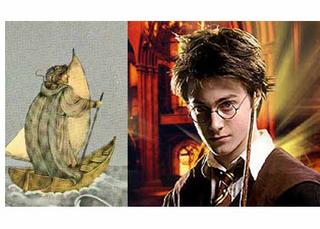
Thanks to Robert's comment on my post about the Harry Potter series, I have inspiration to write.
Before I begin, I'd like to apologize to anyone who finds this discussion a bit juvenille, but these books have had such a strong impact within so many circles that I believe it worthy of such attention.
Robert basically called the HP series a knock-off of Ursula K. LeGuin's fabulous Earthsea Trilogy. I've always thought the stories bore an uncanny resemblance to one another. In fact, when a friend mentioned that they felt the only way for HP to kill Voldemort is to kill himself, I introduced them to LeGuin's work.
To Robert I say, "Yes, Sorcerer's Stone was less than impressive. I wasn't hooked until Chamber of Secrets. I thought to forewarn people to just make it past the first year but didn't wish to dissuade potential readers. Based upon reading the first novel only, one could easily come to the conclusion that "it seemed a lively kid's fantasy crossed with a 'school novel', good fare for its age group[...]".
Of course, LeGuin strives to write in a "literary" fashion. It's no wonder her book only took off within the fantasy reading sphere. Her protagonist, Ged, is a brooding boy that not many children can relate to. His worries seem too adult for that of a tween, his concerns too dark. Readers like being eased into the harder stuff. Each of Rowling's books gets a little darker, but she brings you there slowly, sort of like youth; barring exceptionally rough upbringing, most kids live in a happy-go-lucky bubble and gradually grow more cynical with each passing year. LeGuin slams you right into the darkness.
Now, I'm not going to defend Rowling's writing. From an adult stand point, her sentences tend to hinge on passive to-be constructions and moments in the book seem rhetorical, but this serves her primary audience well. LeGuin's writing is lean and mean, with nary a superfluous word. Much of the characterizations within Rowling's work smacks of Western traditions, but LeGuin's characters and situations are transparent attempts to literarize Jungian Psychology.
One thing, I believe, makes Rowling's series miles more successful than LeGuin's and it isn't the writing. Rowling invites you into the garden party; LeGuin leaves the gate open with the assumption that you'll crash the party without encouragement. This is the overriding attitude of most "literary" authors vs. a bestselling one.
And how is HP "[...]ethically rather mean-spirited"? Who's ethics? Which ethics? HP helped spur on a new love of reading for today's youth. Rowling could have taken her book to an even larger publisher but chose to stay with Scholastic, who tends to act like a non-profit organization spreading their good fortune in the form of free books to those less fortunate.
Now, don't let this sound like a bag on LeGuin. I love her writing. I read the Earthsea Trilogy long before HP. She's one of my favorite authors, actually. But, from an audience analysis point of view, LeGuin writes for a far more sophisticated audience and hopes new readers will struggle along with her more mature style, while Rowling writes for a younger audience with the hopes that adults will enjoy the series as much as the kids, and in most cases, they do.



No comments:
Post a Comment